非谓语动词导学案
高考英语非谓语动词导学案1

——————————教育资源共享步入知识大海————————非谓语动词李仕才非谓语动词综合复习课程目标非谓语动词是高考取特别重要的语法知识,是高考的要点和难点,不论在单项选择、完形填空仍是书面表达中,所占分值均很大,学习时要足够重视,将其与谓语动词划分开,掌握其不一样形式的用法和差异。
一、学习目标1.非谓语动词不一样形式的基本用法。
2.非谓语动词不一样形式的差异,及其和某些从句的转变。
二、要点、难点1.动词不定式和动名词作主语和宾语的差异。
2.动词不定式和此刻分词作定语、状语的差异。
3.不一样形式的非谓语动词的分类和用法。
三、考情剖析非谓语动词在高考取所占分值很大,学生掌握起来有难度,所以一定重视该语法的学习,重视基本用法,并研究历年对于该语法的高考题。
知识梳理一、动名词【用法 1】动名词既拥有动词的一些特点,又具闻名词的句法功能。
动名词的形式:语态主动语态被动语态形式一般式(与谓语动词的动作同时发生)doing being done达成式(谓语动词的动作发生从前)having done having been done【例句】Seeing is believing .目睹为实。
He came to the party without being invited.他未被邀请就到达了晚会。
【考题链接】1.高声朗诵是很有帮助的。
is very helpful.2. 我们一定阻挡空气被污染。
We have to prevent the air from .答案: 1. Reading aloud 2. being polluted【用法 2】1. 动名词能在句中作主语(当动名词短语作主语常常用it 作形式主语)、表语、定语。
作宾语时,若后接宾语补足语,则常用形式宾语it )。
【例句】They haven ’t finished building the dam.他们还没有建好大坝。
(宾语)He can’t walk without a walking -stick.他没有手杖不可以走路。
(完整word版)非谓语动词导学案
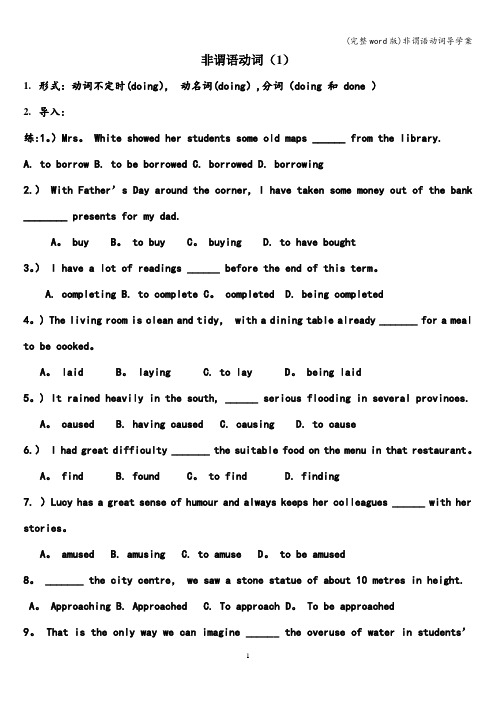
非谓语动词(1)1.形式:动词不定时(doing),动名词(doing),分词(doing 和 done )2.导入:练:1。
)Mrs。
White showed her students some old maps ______ from the library.A. to borrowB. to be borrowedC. borrowedD. borrowing2.)With Father’s Day around the corner, I have taken some money o ut of the bank ________ presents for my dad.A。
buy B。
to buy C。
buying D. to have bought3。
) I have a lot of readings ______ before the end of this term。
A. completingB. to complete C。
completed D. being completed4。
) The living room is clean and tidy, with a dining table already _______ for a meal to be cooked。
A。
laid B。
laying C. to lay D。
being laid5。
) It rained heavily in the south, ______ serious flooding in several provinces. A。
caused B. having caused C. causing D. to cause6.) I had great difficulty _______ the suitable food on the menu in that restaurant。
最好的非谓语动词导学案附答案
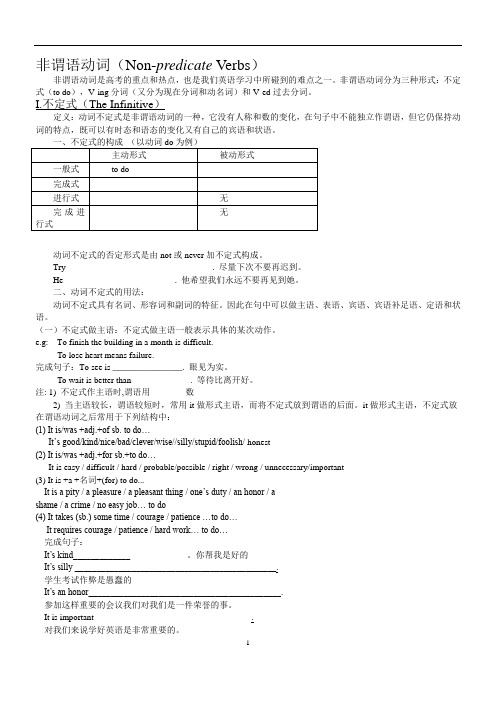
非谓语动词(Non-predicate Verbs )非谓语动词是高考的重点和热点,也是我们英语学习中所碰到的难点之一。
非谓语动词分为三种形式:不定式(to do ),V-ing 分词(又分为现在分词和动名词)和V-ed 过去分词。
I.不定式(The Infinitive )定义:动词不定式是非谓语动词的一种,它没有人称和数的变化,在句子中不能独立作谓语,但它仍保持动词的特点,既可以有时态和语态的变化又有自己的宾语和状语。
动词不定式的否定形式是由not 或never 加不定式构成。
Try _________________________________. 尽量下次不要再迟到。
He _________________________. 他希望我们永远不要再见到她。
二、动词不定式的用法:动词不定式具有名词、形容词和副词的特征。
因此在句中可以做主语、表语、宾语、宾语补足语、定语和状语。
(一)不定式做主语:不定式做主语一般表示具体的某次动作。
e.g: To finish the building in a month is difficult.To lose heart means failure.完成句子:To see is ________________. 眼见为实。
To wait is better than _____________. 等待比离开好。
注: 1) 不定式作主语时,谓语用________数2) 当主语较长,谓语较短时,常用it 做形式主语,而将不定式放到谓语的后面。
it 做形式主语,不定式放在谓语动词之后常用于下列结构中:(1) It is/was +adj.+of sb. to do…It’s good/kind/nice/bad/clever/wise//silly/stupid/foolish/ honest(2) It is/was +adj.+for sb.+to do…It is easy / difficult / hard / probable/possible / right / wrong / unnecessary/important(3) It is +a +名词+(for) to do...It is a pity / a pleasure / a pleasant thing / one’s duty / an honor / ashame / a crime / no easy job… to do(4) It takes (sb.) some time / courage / patience …to do…It requires courage / patience / hard work… to do…完成句子:It’s kind__________________________。
非谓语动词导学案
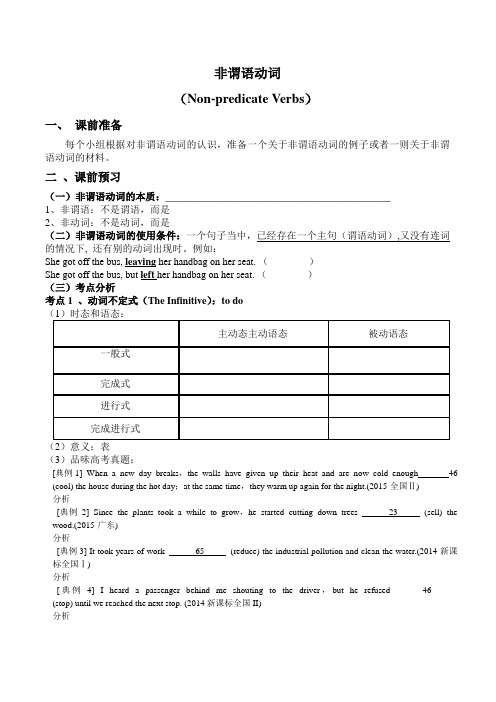
非谓语动词(Non-predicate Verbs)一、课前准备每个小组根据对非谓语动词的认识,准备一个关于非谓语动词的例子或者一则关于非谓语动词的材料。
二、课前预习(一)非谓语动词的本质:_____________________________________________1、非谓语:不是谓语,而是____________________________________________2、非动词:不是动词,而是____________________________________________(二)非谓语动词的使用条件:一个句子当中,已经存在一个主句(谓语动词),又没有连词的情况下, 还有别的动词出现时。
例如:She got off the bus, leaving her handbag on her seat. ()She got off the bus, but left her handbag on her seat. ()(三)考点分析考点1 、动词不定式(The Infinitive):to do(3)品味高考真题:[典例1] When a new day breaks,the walls have given up their heat and are now cold enough 46 (cool) the house during the hot day;at the same time,they warm up again for the night.(2015·全国Ⅱ)分析_______________________________________________________________________________________ [典例2] Since the plants took a while to grow,he started cutting down trees 23 (sell) the wood.(2015·广东)分析_______________________________________________________________________________________ [典例3] It took years of work 65 (reduce) the industrial pollution and clean the water.(2014·新课标全国Ⅰ)分析_______________________________________________________________________________________ [典例4] I heard a passenger behind me shouting to the driver,but he refused ______46______ (stop) until we reached the next stop. (2014新课标全国II)分析_______________________________________________________________________________________(4)方法归纳:对于不定式的考查,需注意不定式的时态和语态,熟记常考跟不定式作宾语的动词以及一些常考句式。
非谓语动词导学案
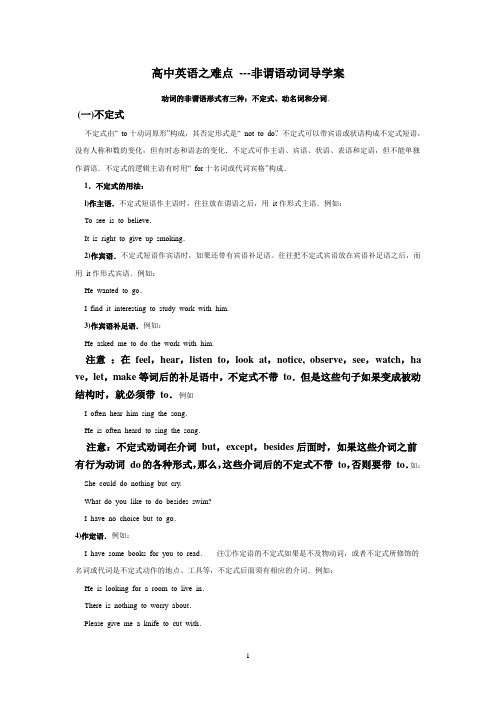
高中英语之难点---非谓语动词导学案动词的非谓语形式有三种:不定式、动名词和分词.(一)不定式不定式由“ to十动词原形”构成,其否定形式是“ not to do”.不定式可以带宾语或状语构成不定式短语,没有人称和数的变化,但有时态和语态的变化.不定式可作主语、宾语、状语、表语和定语,但不能单独作谓语.不定式的逻辑主语有时用“ for十名词或代词宾格”构成.1.不定式的用法:l)作主语.不定式短语作主语时,往往放在谓语之后,用it作形式主语.例如:To see is to believe.It is right to give up smoking.2)作宾语.不定式短语作宾语时,如果还带有宾语补足语。
往往把不定式宾语放在宾语补足语之后,而用it作形式宾语.例如:He wanted to go.I find it interesting to study work with him.3)作宾语补足语.例如:He asked me to do the work with him.注意:在feel,hear,listen to,look at,notice, observe,see,watch,ha ve,let,make等词后的补足语中,不定式不带to.但是这些句子如果变成被动结构时,就必须带to.例如I often hear him sing the song.He is often heard to sing the song.注意:不定式动词在介词but,except,besides后面时,如果这些介词之前有行为动词do的各种形式,那么,这些介词后的不定式不带to,否则要带to.如:She could do nothing but cry.What do you like to do besides swim?I have no choice but to go.4)作定语.例如:I have some books for you to read.注①作定语的不定式如果是不及物动词,或者不定式所修饰的名词或代词是不定式动作的地点、工具等,不定式后面须有相应的介词.例如:He is looking for a room to live in.There is nothing to worry about.Please give me a knife to cut with.但是,不定式所修饰的名词如果是time,place或way,不定式后面的介词习惯上要省去.例如:He had no money and no place to live.注②当作定语的不定式所修饰的名词或代词是不定式动作的承受者时,不定式既可以用主动语态,也可用被动语态,但其含义有所不同.试比较:A) Have you anything to send?你有什么东西要寄吗?(不走式to send的动作执行者是you)B) Have you anything to be sent?你有什么要(我或别人)寄的东西吗?(不定式to be sent的动作执行者是已被省略的me或someone else)5)作状语,表示目的、原因、结果或条件.例如:I came here to see you.(目的)We were very excited to hear the news.(原因)He hurried to the school to find nobody there.(结果)To look at him, you would like him.(条件)目的状语还可以用in order to或so as to来表示.如:In order to pass the exam, he worked very hard.We ran all the way so as not to be late.不定式也可在作表语用的形容词后面作状语.例如:I am very glad to hear it.The question is difficult to answer.“ too十形容词或副词十不定式”作状语.例如:He is too old to do that.另外句子中有enough这个词时,常用不定式作状语.例如:The room is big enough to hold us.6)作表语.例如:My job is to help the patient.7)作独立成分.例如:To tell the truth,I don’t agree with you.8)不定式与疑问词who,which,when,where,how,what等连用,在句中起名词作用,可充当主语、表语、宾语等.例如:He didn’t know what to say.(宾语)How to solve the problem is very important.(主语)My question is when to start. (表语)注意:在与why连用时,只用于why或why not开头的简短疑问句中,后面紧跟的动词不定式不带to.例如:Why not have a rest?9)不定式在句中用主动式还是被动式。
非谓语动词导学案
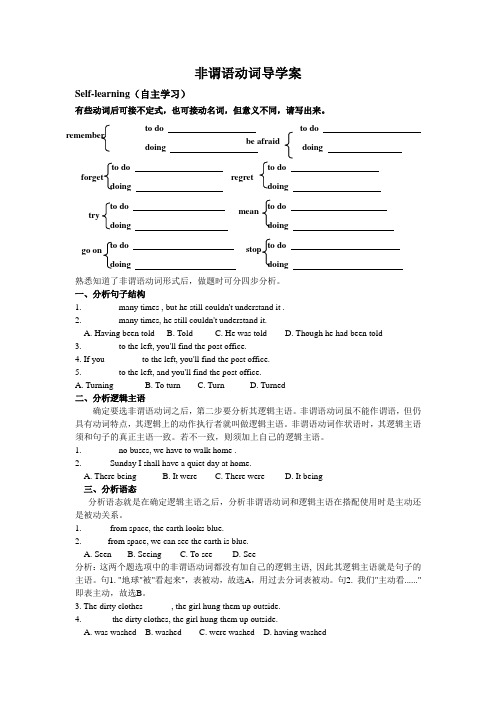
非谓语动词导学案Self-learning (自主学习)有些动词后可接不定式,也可接动名词,但意义不同,请写出来。
to do to dodoing doing to do to dodoingdoingto dodoingto do to do doing doing 熟悉知道了非谓语动词形式后,做题时可分四步分析。
一、分析句子结构1. ________many times , but he still couldn't understand it .2. ________many times, he still couldn't understand it.A. Having been toldB. ToldC. He was toldD. Though he had been told3. ________to the left, you'll find the post office.4. If you ________to the left, you'll find the post office.5. ________to the left, and you'll find the post office.A. TurningB. To turnC. TurnD. Turned二、分析逻辑主语确定要选非谓语动词之后,第二步要分析其逻辑主语。
非谓语动词虽不能作谓语,但仍具有动词特点,其逻辑上的动作执行者就叫做逻辑主语。
非谓语动词作状语时,其逻辑主语须和句子的真正主语一致。
若不一致,则须加上自己的逻辑主语。
1. ________no buses, we have to walk home .2. ______Sunday I shall have a quiet day at home.A. There beingB. It wereC. There wereD. It being三、分析语态分析语态就是在确定逻辑主语之后,分析非谓语动词和逻辑主语在搭配使用时是主动还是被动关系。
英语非谓语动词讲解导学案
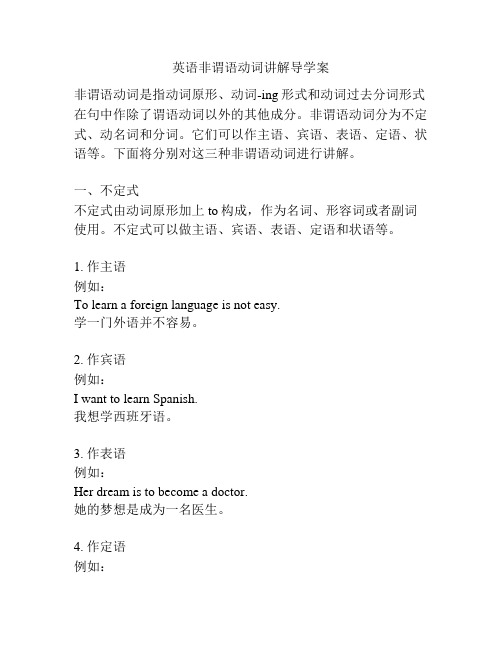
英语非谓语动词讲解导学案非谓语动词是指动词原形、动词-ing形式和动词过去分词形式在句中作除了谓语动词以外的其他成分。
非谓语动词分为不定式、动名词和分词。
它们可以作主语、宾语、表语、定语、状语等。
下面将分别对这三种非谓语动词进行讲解。
一、不定式不定式由动词原形加上to构成,作为名词、形容词或者副词使用。
不定式可以做主语、宾语、表语、定语和状语等。
1. 作主语例如:To learn a foreign language is not easy.学一门外语并不容易。
2. 作宾语例如:I want to learn Spanish.我想学西班牙语。
3. 作表语例如:Her dream is to become a doctor.她的梦想是成为一名医生。
4. 作定语例如:The best way to learn English is to practice speaking.学习英语的最好方法是练习口语。
5. 作状语例如:He came here to see his friend.他来这里是为了见他的朋友。
二、动名词动名词由动词原形加上-ing构成,作为名词使用。
动名词可以作主语、宾语、表语、定语和状语等。
1. 作主语例如:Swimming is good exercise.游泳是一项很好的运动。
2. 作宾语例如:I enjoy playing basketball.我喜欢打篮球。
3. 作表语例如:Her hobby is dancing.她的爱好是跳舞。
4. 作定语例如:She is a swimming coach.她是一名游泳教练。
5. 作状语例如:He learned English by watching movies.通过看电影他学会了英语。
三、分词分词有现在分词和过去分词两种形式。
现在分词以-ing结尾,过去分词则有多种不规则形式。
分词可以作定语、表语和状语等。
1. 作定语例如:The broken car needs to be repaired.那辆坏车需要修理。
高三非谓语动词导学案
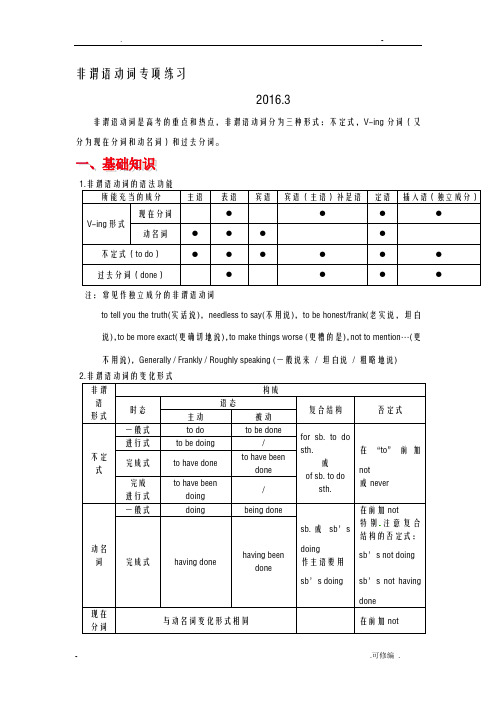
非谓语动词专项练习2016.3非谓语动词是高考的重点和热点,非谓语动词分为三种形式:不定式,V-ing分词(又分为现在分词和动名词)和过去分词。
所能充当的成分主语表语宾语宾语(主语)补足语定语插入语(独立成分)V-ing形式现在分词●●●●动名词●●●●不定式(to do)●●●●●●过去分词(done)●●●●注:常见作独立成分的非谓语动词to tell you the truth(实话说),needless to say(不用说),to be honest/frank(老实说,坦白说),to be more exact(更确切地说),to make things worse (更糟的是),not to mention…(更不用说),Generally / Frankly / Roughly speaking (一般说来/ 坦白说/ 粗略地说)非谓语形式构成时态语态复合结构否定式主动被动不定式一般式to do to be donefor sb. to dosth.或of sb. to dosth.在“to”前加not或never进行式to be doing /完成式to have doneto have beendone完成进行式to have beendoing/动名词一般式doing being donesb.或sb’sdoing作主语要用sb’s doing在前加not特别注意复合结构的否定式:sb’s not doingsb’s not havingdone完成式having donehaving beendone现在分词与动名词变化形式相同在前加not(一)辨别谓语与非谓语特别注意分析句子的结构才能辨别谓语与非谓语。
①The traffic rule says young children under the age of four and __ less than 40 pounds mustbe in a child safety seat.A. being weighedB.weighsC.weighedD.weighing【解析】容易误选B或C,将其当成谓语看待。
非谓语动词(学生导学案)

高三语法总复习:非谓语动词思维向导1. 找出句中的非谓语动词并分析其句子成分。
1. To see you is glad. = It’s glad to see you. 作主语2. I want to see you. __________3. My hope is to see you. ___________4. I want him to see you.____________5. He is the man to see you.__________6. I’m glad to see you.___________7. I went to see you. __________8. Swimming is his favorite sport. _____________9. He enjoys swimming. ___________10. His favorite sport is swimming. ____________11. I found him swimming in the river. ____________12. He is the man swimming in the river just now. ___________13. Swimming in Summer, we can get cool. ____________14. This cup is broken. ______________15. This is a broken cup. ______________16. I found the cup broken. ______________17. Broken by Tom, the cup can’t be used.______________Conclusion(小结促学一)非谓语动词分类:______________;_______________;______________动词不定式在句子中可以充当____________________________________________________;动词-ing形式在句子中可以充当__________________________________________________;过去分词在句子中可以充当______________________________________________________。
非谓语动词导学案 有配套课件
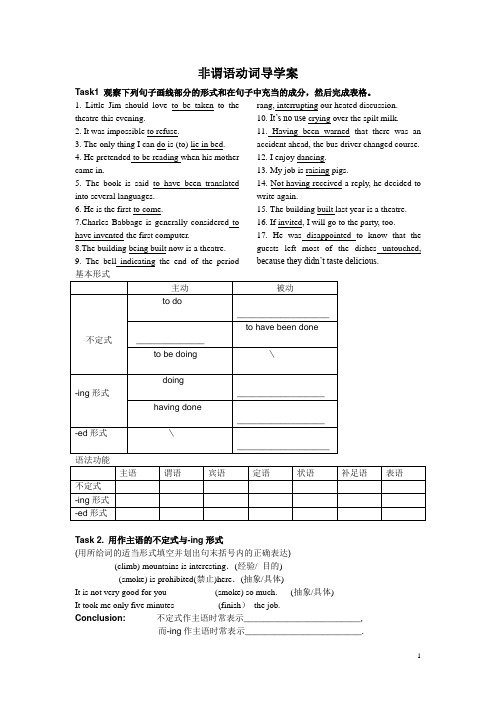
非谓语动词导学案Task1 观察下列句子画线部分的形式和在句子中充当的成分,然后完成表格。
1. Little Jim should love to be taken to the theatre this evening.2. It was impossible to refuse.3. The only thing I can do is (to) lie in bed.4. He pretended to be reading when his mother came in.5. The book is said to have been translated into several languages.6. He is the first to come.7.Charles Babbage is generally considered to have invented the first computer.8.The building being built now is a theatre.9. The bell indicating the end of the period rang, interrupting our heated discussion.10. It’s no use crying over the spilt milk.11. Having been warned that there was an accident ahead, the bus driver changed course.12. I enjoy dancing.13. My job is raising pigs.14. Not having received a reply, he decided to write again.15. The building built last year is a theatre.16. If invited, I will go to the party, too.17. He was disappointed to know that the guests left most of the dishes untouched, because they didn’t taste delicious.Task 2. 用作主语的不定式与-ing形式(用所给词的适当形式填空并划出句末括号内的正确表达)_________(climb) mountains is interesting.(经验/ 目的)__________(smoke) is prohibited(禁止)here.(抽象/具体)It is not very good for you_________ (smoke) so much. (抽象/具体)It took me only five minutes _________ (finish)the job.Conclusion: 不定式作主语时常表示________________________,而-ing作主语时常表示________________________.Task 3. 用作宾语的不定式与-ing 形式(Practice)1. He pretended ______________(read) when his mother came in.2. Little Jim should love ________________(take) to the theatre this evening.3. Do you mind _______ alone at home?A. Jane leavingB. Jane having leftC. Jane’s being leftD. Jane to be left4. Babies enjoy ___ before they go to sleep.A.to patB. to be pattedC. pattingD. being patted.5. While shopping, people sometimes can’t help ______ into buying something they don’t really need.A.to persuadeB. persuadingC. being persuadedD. be persuaded6. He is praised for ___ his whole life to the country.A. having devotedB. devotingC. devotedConclusion:少数动词只能用-ing形式作宾语(写出下列动词):考虑建议盼原谅,承认推迟没得想;_________________________________________-_ _______________________________________________________________________ 避免错过继续练,否认完成就欣赏;___________________________________________ _______________________________________________________________________ 禁止想象才冒险,不禁介意准逃亡。
非谓语动词导学案

非谓语动词导学案在英语语法中,非谓语动词是指动词不作为谓语时所形成的动词形式,包括不定式、动名词和分词。
非谓语动词在句子中起到各种不同的作用,能够帮助我们表达更加准确和丰富的信息。
在学习非谓语动词时,我们需要注意其形式、用法和特点,下面就让我们一起来详细了解一下非谓语动词吧。
一、不定式不定式是非谓语动词中的一种形式,一般由“to + 动词原形”构成。
不定式在句子中可以用作主语、宾语、表语、定语或状语等,具有多种不同的用法。
1. 作主语To learn English well is important.(学好英语很重要。
)2. 作宾语I want to improve my English.(我想要提高我的英语。
)3. 作表语Her dream is to study abroad.(她的梦想是出国留学。
)4. 作定语The best way to learn English is to practice every day.(学英语最好的方法就是每天练习。
)She went to the library to borrow some books.(她去图书馆借了一些书。
)二、动名词动名词是非谓语动词中的一种形式,一般在动词后面加上“-ing”构成。
动名词在句子中常常作主语、宾语、表语、定语或状语等,具有多种不同的用法。
1. 作主语Swimming is good exercise.(游泳是一种很好的锻炼。
)2. 作宾语I enjoy reading books.(我喜欢看书。
)3. 作表语His favorite activity is playing basketball.(他最喜欢的活动是打篮球。
)4. 作定语I have a lot of homework to finish.(我有很多作业要完成。
)5. 作状语He broke his leg while skiing.(他滑雪时摔断了腿。
高三英语一轮复习----非谓语动词复习导学案

非谓语动词复习导学案Learning aims:一.Language knowledge aims:一)掌握非谓语动词的分类二)掌握非谓语动词的功能表三)掌握非谓语动词的做题步骤和做题方法判断谓语动词还是非谓语动词1.He ______on the stone .2.He _____ the door and _____ the office.3.Yesterday I ____ shopping, ____some books and _____ dinner at a good restaurant.4.He _____ TV when I ______ the room.5.Time _____, they'll visit the Great Wall.6.If time _____, they’ll visit the Great Wall.7.When you _______ the road, you should be careful.8. When _______ the road, you should be careful.9.It ____ a rainy day ; we decided not to go there.10._____ 10 kilometers every day is a challenging game for a normal person.11. Recently a survey _______ prices of the same goods in two different supermarkets has caused a heated debate among citizens. Something we must know about Non-finite Verbs:概述1.谓语动词:在句子中担任谓语的动词2. 非谓语动词:是动词但在句中不做谓语,可以作除谓语外的所有成分。
非谓语动词导学案

非谓语动词★你知道吗?1.什么是非谓语动词?2.非谓语动词的形式有哪些?3.将每一种非谓语动词形式分别用四个字总结是什么呢?4.什么叫做逻辑主语?5.你能找出下列句子中的谓语动词和非谓语动词形式吗?⑴He wants to know your name.⑵Can you hear a girl singing in the classroom?⑶Looking out of the window, I find a baby crying.⑷The teacher came in, followed by the students.⑸She stopped to see what happened.6.非谓语动词有自己的时态和语态,你能说出它们的各种变化形式吗?注意:动词不定式和动词ing形式的一般式表示非谓语动词的动作与谓语动词的动作是同时发生或在谓语动词动作之后发生,它们的完成式则表示非谓语的动作是先于谓语动词动作发生。
Having finished my homework, I went out to play.On arriving in Beijing, I felt very excited.He is said to have finished his essay.To catch the bus , I must get up early.7.总结靠自己非谓语动词有自己的句法功能,即在句子中充当一定的成分,分析下列句子,完成表格内容。
1.To help poor people is our duty.2.Learning new words is very useful to me.3.We hope to borrow my dictionary.4.Have you mind opening the window?5.The great happiness is to serve the people.6.I’m interested in what he said.7.Her job is teaching. 8.Have you got anything to do this evening?9.The girl standing there is my sister. 10.The broken cup is mine.11.To catch the first bus, I have to get up early. 12.Working hard, you will succeed.13.Seen from the hill, the town looks very beautiful.14.Don’t have me waiting for one hour like last time.15.My mother doesn’t allow me to go out alone at night .16.I had my bike repaired yesterday.★你是治病高手吗?1.My job is looked after the little baby .2.Finishing the homework , I went home .3.Be a Party member , I should work hard .4.Giving more time ,I can do my work better .5.He ran out of the classroom ,shout at the boy.6.To getting more knowledge , we must work harder and harder .7.He is old enough join the army .8. He came to the party without being invite.9. Read aloud is very helpful.10.The building is being built is our new library.★小试牛刀,高考你行吗?1.They knew her very well.They had seen her ____ up from childhood.(MET88)A.grow B.grew C.was growing D.to grow2.— What do you think of the book?— Oh, excellent.It' s worth ____ a second time.(MET89)A.to read B.to be read C.reading D.being read3.____ more attention ,the tree could have grown better.(MET90)A.Given B.To give C.Giving D.Having given4.Most of the artists ____ to the party were from South Africa.(MET90)A.invited B.to invite C being invited D.had been invited5. ____ a reply, he decided to write again.(MET92)A.Not receiving B.Receiving notC.Not having received D.Having not received6."Can't you read?" Mary said ____ to the notice.(MET93)A.angrily pointing B.and point angrily C.angrily pointed D.and angrily pointing 7.____ is a good form of exercise for both young and old.(NMET92)A.The walk B.Walking C.To walk D.Walk8.There was a terrible noise ____ the sudden burst of light.(MET89)A.followed B.following C.to be followed D.being followed9.--- Good morning.Can I help you? --- I'd like to have this package, madam.(MET89) A.be weighed B.to be weighed C.to weigh D.weighed10.Jane was made ____ the truck for a week as a punishment.(MET91)A.to wash B.washing C.wash D.to be washing★测一测、练一练1.--- I usually go there by train.--- Why not ____ by boat for a change? (MET92)A.to try going B.trying to go C.to try and go D.try going2.I would appreciate ____ back this afternoon.(MET92)A.you to call B.you call C.your calling D.you’re calling3.____ is a good form of exercise for both young and old.(NMET92)A.The walk B.Walking C.To walk D.Walk4..The computer center, ____ last year, is very popular among the students in thisschool. (MET93)A.open B.opening C.having opened D.opened5..Charles Babbage is generally considered ____ the first computer.(MET93)A. to inventB. inventingC. to have inventedD. having invented6.How about the two of us ____ a walk down the garden? (MET93)A.to take B.take C.taking D.to be taking7.____ down the radio--the baby's asleep in the next room.(MET93)A. Turning B.To turn C.Turned D.Turn8.The visiting Minister expressed his satisfaction with his talks, ____ that he had enjoyed his stay here.(NMET94)A.having added B.to add C.adding D.added9.The first text books ____ for teaching English as a foreign language came out in the 16th century.(NMET94)A.having written B.to be written C.being written D.written10.She set out soon after dark ____ home an hour later.(NMET94)A.arriving B.to arrive C.having arrived D.and arrived。
非谓语动词导学案
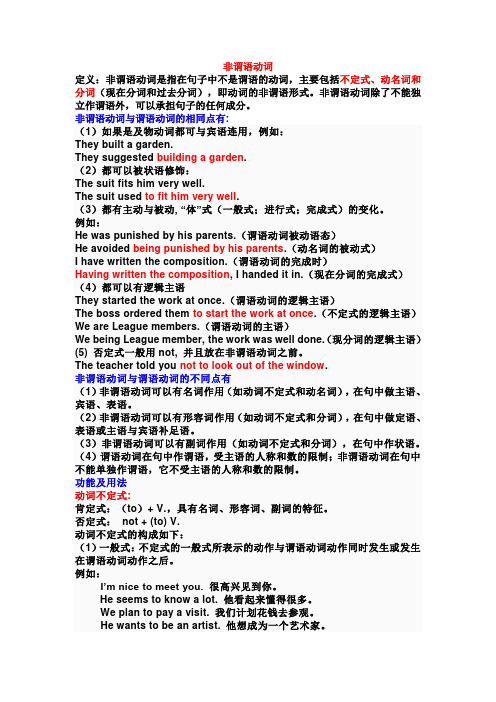
非谓语动词定义:非谓语动词是指在句子中不是谓语的动词,主要包括不定式、动名词和分词(现在分词和过去分词),即动词的非谓语形式。
非谓语动词除了不能独立作谓语外,可以承担句子的任何成分。
非谓语动词与谓语动词的相同点有:(1)如果是及物动词都可与宾语连用,例如:They built a garden.They suggested building a garden.(2)都可以被状语修饰:The suit fits him very well.The suit used to fit him very well.(3)都有主动与被动, “体”式(一般式;进行式;完成式)的变化。
例如:He was punished by his parents.(谓语动词被动语态)He avoided being punished by his parents.(动名词的被动式)I have written the composition.(谓语动词的完成时)Having written the composition, I handed it in.(现在分词的完成式)(4)都可以有逻辑主语They started the work at once.(谓语动词的逻辑主语)The boss ordered them to start the work at once.(不定式的逻辑主语)We are League members.(谓语动词的主语)We being League member, the work was well done.(现分词的逻辑主语)(5) 否定式一般用not, 并且放在非谓语动词之前。
The teacher told you not to look out of the window.非谓语动词与谓语动词的不同点有(1)非谓语动词可以有名词作用(如动词不定式和动名词),在句中做主语、宾语、表语。
非谓语动词导学案(二)
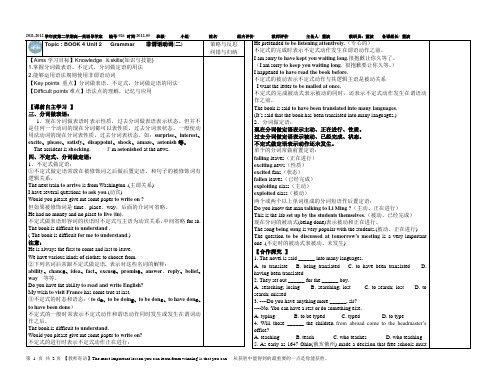
2. The Olympic Games, ______ in 776 B.C., did not include women players until 1912.
A. first playingB. to be first playedC. first playedD. to be first playing
A. hidingB. hidC. hiddenD. hide
6. —How do you deal with the disagreement between the company and the customers?
—key(关键、钥匙) ______ the problem is to meet the demand _______ by the customers.
Topic : BOOK 4 Unit 2Grammar非谓语动词(二)
策略与反思
纠错与归纳
【Aims学习目标】Knowledge&skills(知识与技能)
1.掌握分词做表语、不定式,分词做定语的用法
2.能够运用语法规则使用非谓语动词
【Key points重点】分词做表语、不定式,分词做定语的用法
(I am sorryto keep you waiting long.很抱歉要让你久等。)
I happenedto have read the book before.
不定式的被动表示不定式动作与其逻辑主语是被动关系
I want the letterto be mailed at once.
不定式的完成被动式表示被动的同时,还表示不定式动作发生在谓语动作之前。
非谓语动词导学案
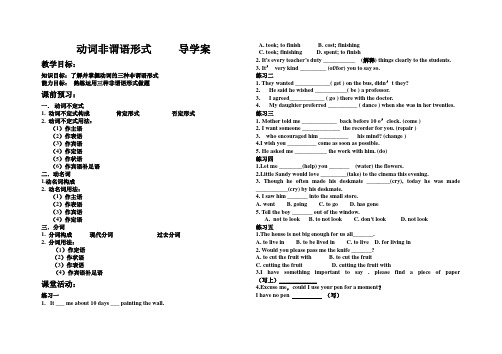
动词非谓语形式导学案教学目标:知识目标:了解并掌握动词的三种非谓语形式能力目标:熟练运用三种非谓语形式做题课前预习:一.动词不定式1. 动词不定式构成肯定形式否定形式2. 动词不定式用法:(1)作主语(2)作表语(3)作宾语(4)作定语(5)作状语(6)作宾语补足语二.动名词1.动名词构成2. 动名词用法:(1)作主语(2)作表语(3)作宾语(4)作定语三.分词1. 分词构成现代分词过去分词2. 分词用法:(1)作定语(2)作状语(3)作表语(4)作宾语补足语课堂活动:练习一1.It ___ me about 10 days ___ painting the wall.A. took; to finishB. cost; finishingC. took; finishingD. spent; to finish2. It’s every teacher’s duty ___________ (解释) things clearly to the students.3. It’very kind _________ (of/for) you to say so.练习二1. They wanted ____________( get ) on the bus, didn’t they?2. He said he wished ___________( be ) a professor.3. I agreed____________ ( go ) there with the doctor.4. My daughter preferred __________ ( dance ) when she was in her twenties. 练习三1. Mother told me ____________ back before 10 o’clock. (come )2. I want someone _____________ the recorder for you. (repair )3. who encouraged him __________ his mind? (change )4.I wish you __________ come as soon as possible.5. He asked me ___________ the work with him. (do)练习四1.Let me ________(help) you _______ (water) the flowers.2.Little Sandy would love _________(take) to the cinema this evening.3. Though he often made his deskmate ________(cry), today he was made ___________(cry) by his deskmate.4. I saw him _______ into the small store.A. wentB. goingC. to goD. has gone5. Tell the boy _______ out of the window.A.not to lookB. to not lookC. don't lookD. not look练习五1.The house is not big enough for us all_______.A. to live inB. to be lived inC. to liveD. for living in2. Would you please pass me the knife _______?A. to cut the fruit withB. to cut the fruitC. cutting the fruitD. cutting the fruit with3.I have something important to say . please find a piece of paper (写上)_____________4.Excuse me,could I use your pen for a moment?I have no pen (写)练习六1.All the Chinese people must work hard ____ China Dream.A. to realizeB. realizeC. realizingD. realized2. _____ late in the morning, Bob turned off the alarm.A. To get upB. getting upC. get upD. Having gotten up3. Why do we eat vegetables every day, Mum?______ healthy, my dear.A. KeepB. To keepC. KeepingD. Kept练习七1. I hope everyone can care about ____ the environment and stop _____ things.A.protecting; wastingB. protecting; to wasteC.to protect; wastingD. to protect; to waste2. The book is well worth ______ . I plan _____ one.A. read; to buyB. reading; buying;C. reading; to buyD. to read; to buy练习八1. Boys, don‘t forget _____ the windows before you leave the classroom.A. closingB. closedC. to closingD. to close2.She reached the top of the hill and stopped _______ on a big rock.A. to have restedB. restingC. to restD. rest3. Remember _______ the lights when you leave the office.A. to turn offB. turning offC. turn offD. to turning off 检测:1.Thank you for us so well .A. to teachB. teachesC. taughtD. teaching2. I often do some on Sundays.A. washedB. to washC. washingD. washes3. The boy Jack in Class One is my brother.A. callB. to be calledC. callingD. called4. It often takes me half an hour home.A. WalkingB. to walkC. walkedD. walks5. Don’t forget her clean water every day .A. to giveB. givingC. givenD. give6. I think it is important English well .A. learningB. learnC. to learnD. learned7. The funny story made us all hard .A. laughB. to laughC. laughingD. laughed8. Our teacher told us hard at our lessons .A. to workB. workC. workingD. worked9. Could you tell me this newspaper ?A. to read howB. how to readC. what to readD. what read10. I don’t know next .A. what to doB. what to do itC. how to doD. to how do it11. My hair is too long , so I must have it this afternoon.A. cutB. cutsC. cuttingD. cutted12. Remember late for class again .A. not toB. be not toC. not to beD. not to come13. Mr. Smith asked the man the queue .A. not jumpB. didn’t jumpC. not to jumpD. to not jump14.Why not with us ? You see , it’s very.A. go ; interestedB. go; interestingC. to go; interestedD. going; interesting15.– What about to the cinema tonight ?--That’s a good idea. I’d like with you.A. going ; goingB. to go ; to goC. going ; to goD. go ; going16.Everyone here is busy read for the comingentrance tests .A. getB. to getC. gettingD. gets17.we’ve worked for two hours . Let’s a rest .A. stop to haveB. stop havingC. to stop to have D .stopping having18. Would you mind me a favor(恩惠)?A. doB. to goC. doingD. did19. Mr. Wang asked me him .A. helpB. helpsC. to helpD. helping20. Please tell Jim not late again .A. toB. beC. to beD. be to作业:。
非谓语动词导学案 4 to do,doing, done 作主语和表语
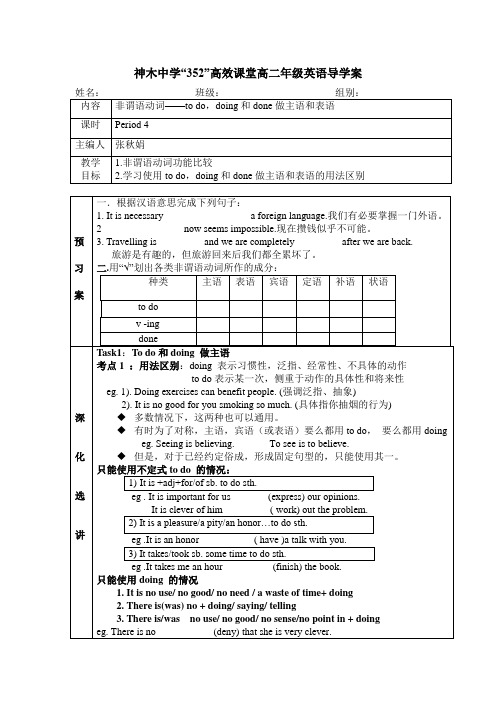
姓名:__________ 班级:______பைடு நூலகம்__ 组别:_________ 内容 非谓语动词——to do,doing 和 done 做主语和表语 课时 主编人 教学 目标 Period 4 张秋娟 1.非谓语动词功能比较 2.学习使用 to do,doing 和 done 做主语和表语的用法区别
深
化
选
讲
There is no ______(tell) what will happen in the future.( = It is impossible to tell….) There is no point in___________ (argue)further. 温馨提示:但在下两个句子中只能用不定式 There is no need(for sb)to do sth There is no hurry to do 考点 2: doing 的复合结构(doing 带自己的逻辑主语) 其逻辑主语一般由物主代词、 名词所有格来充当。在口语中,只要不作主语,doing 的复合结构中的逻辑主语可 以由人称代词的宾格和名词的普通格代替。 eg: Their coming to help was a great encouragement to us. Rose’s going won’t be of much help. 判断正误:1.His being late made the teacher angry. ( ) 2.Him being late made the teacher angry.( ) 3.Tom going will influence them.( ) 高考陷阱题 1. what 在问句中作主语时,如何回答? 1) --What made your brother so delighted? --____ for his progress. A. His teacher praised him B. His being praised by his teacher C. His teacher having praised him D. He was praised by his teacher 2) -- What caused the party to be put off?\ --_____ the invitations. A. Tom delayed sending B. Tom delayed to send C. Tom delaying to send D. Tom’s delaying sending Task2: 非谓语动词作表语 1. 动词不定式作表语表示具体或将来某一次动作时常用; V-ing 作表语表示经常性、泛指的动作时,常用动词。 1) Their job is _________( build) houses. 2) Some people’s greatest pleasure is __________(fish)in the sun. 2. 现在分词作表语可以表示主语所具有的性质特征, 过去分词作表语可以表示主语所处的状态。 1). Climbing mountains was ______ , so we all felt ______ .(tire) 2).The report was so __________(inspire ) that they were all __________(excite). 3).--I'm very _______ with my own cooking. It looks nice and smells delicious. -- Mm. It does have a _________ smell. (please) 1) It is no good __________. You should give_________. A. to smoke, it up B. smoking, it up C. smoking, up it D. to smoke, up it 2) There’s no need for you _______ if you don`t want to. e B. coming C. to come D. coming in 3)-- What do you think made Mary so upset? --_______ her new bicycle. A. As she lost B. Lost C. Losing D. Because of losing 4) How _______the problem will be discussed at tomorrow’s meeting. A. to solve B. to be solved C. being solved D. solving 5) _____ as a model worker was a great encouragement to us. A. Being elected B. His being elected C. He being elected D. He was elected
2024届高三英语一轮复习语法之非谓语动词一+导学案

非谓语动词一1.动词不定式和动名词作宾语动词+to do1. 同意做某事______________7. 准备做某事______________2. 主动提出做某事______________8. 决定做某事______________3. 计划做某事______________9. 拒绝做某事______________4. 想要做某事______________10. 选择做某事______________5. 答应做某事______________11. 宁愿做某事______________6. 帮忙做某事______________12. 希望做某事______________动词+doing1. 练习做某事______________ 5. 介意做某事______________2. 完成做某事______________ 6. 建议做某事______________3. 享受做某事______________7. 想像做某事______________4. 坚持做某事______________8. 避免做某事______________介词+doing常见介词:______________________________________________________即学即练1. Not many people wanted to ask children ________(work) for them.2. Without ________(thinking) for long,she bought them.3.Briefly speaking,it’s such skills that keep them hunting and protect them from ________ (be) hunted.4. Yesterday,I was in charge of ________(cook) the hot dog.5. Men certainly avoid ________(try) on a large number of clothes.6. After ________(test) on mice and monkeys,Tu and her two teammates volunteeredto do many tests on their own bodies.7. I refused ________(take) off my shoes.I couldn’t stand others seeing the holes inmy socks.2.动词不定式和动名词作补语1. 看见某人经常做/正在做某事__________________________2. 听见某人经常做/正在做某事__________________________3. 观看某人经常做/正在做某事__________________________4. 发现某人经常做/正在做某事__________________________5. 注意某人经常做/正在做某事__________________________动词+sb.+to do1. 命令某人做某事______________ 6. 鼓励某人做某事______________2. 告诉某人做某事______________7. 允许某人做某事______________3. 要求某人做某事______________8. 邀请某人做某事______________4. 建议某人做某事______________9. 帮助某人做某事______________5. 需要某人做某事______________10. 希望某人做某事______________即学即练1. I saw her________(cry) when I came into the classroom.2. They heard her________(sing) in the next room just now.3. They got up early to see the sun___________(rise).4. --- Do you often hear John________(sing) in his room?---Yes.Listen!Now we can hear him________(sing) in his room.3.既可接不定式又可接动名词的动词1. 记得做过某事______________记得去做某事______________2. 忘记做过某事______________忘记去做某事______________3. 尽力做某事______________尝试做某事______________4. 停下做另一件事______________停止做某事______________即学即练1. She usually goes to school by bus,but this week she tries________(ride) a bike.2. Certainly I posted your letter.I remember________(post) it.3. I shall never forget_______(see) the Alps for the first time.It was really beautiful.4. Don’t forget_________(take) an umbrella with you. It’s going to rain.5. Mr.White tried________(stop) his ambulance,but it was too late.6. If he stops_________(play) computer games,he won’t finish doing his homework on time.7.Remember______(bring) the book here tomorrow.8.--- Let’s have a rest,shall we?--- Not now.I don’t want to stop_______(write) the letter yet.4.其他常考的非谓语动词词组及句型1. 在做......方面成功______________7. 被用来做某事______________2. 值得做某事______________8. 习惯于做某事______________3. 忙于做某事______________9. 盼望做某事______________4. 因为做......而感谢______________10. 专注做某事______________5. 在做......方面有困难______________11. 放弃做某事______________6. 过去常常做某事______________即学即练1.He used______(drive) on the right in China,but he soon got used______(drive) on the left in England.2. ---How is your grandma?---She’s fine.She used to_____(watch) TV at home after supper.But now she is used to_____ (go)out for a walk.3. --- Have you read the book Jane Eyre?--- Yes. It’s a famous book and really worth _______ (read).4. He used to_______(live) in a small village,but now he has been used to________ (live) in a big city.。
- 1、下载文档前请自行甄别文档内容的完整性,平台不提供额外的编辑、内容补充、找答案等附加服务。
- 2、"仅部分预览"的文档,不可在线预览部分如存在完整性等问题,可反馈申请退款(可完整预览的文档不适用该条件!)。
- 3、如文档侵犯您的权益,请联系客服反馈,我们会尽快为您处理(人工客服工作时间:9:00-18:30)。
非谓语动词(1)1.形式:动词不定时(doing), 动名词(doing),分词(doing 和done )2.导入:练:1.)Mrs. White showed her students some old maps ______ from the library.A. to borrowB. to be borrowedC. borrowedD. borrowing2.)With Father’s Day around the corner, I have taken some money o ut of the bank ________ presents for my dad.A. buyB. to buyC. buyingD. to have bought3.)I have a lot of readings ______ before the end of this term.A. completingB. to completeC. completedD. being completed4.)The living room is clean and tidy, with a dining table already _______ for a meal to be cooked.A. laidB. layingC. to layD. being laid5.)It rained heavily in the south, ______ serious flooding in several provinces.A. causedB. having causedC. causingD. to cause6.)I had great difficulty _______ the suitable food on the menu in that restaurant.A. findB. foundC. to findD. finding7. )Lucy has a great sense of humour and always keeps her colleagues ______ with her stories.A. amusedB. amusingC. to amuseD. to be amused8. _______ the city centre, we saw a stone statue of about 10 metres in height.A. ApproachingB. ApproachedC. To approachD. To be approached9. That is the only way we can imagine ______ the overuse of water in students’ bathrooms.A. reducingB. to reduceC. reducedD. reduce10. ______ at my classmates’ faces, I read the same excitement in their eyes.A. LookingB. LookC. To lookD. Looked一.动词不定式的用法判断下面不定式在句中的成分1.To finish the work in ten minutes is difficult. ()2. He wants to go abroad. ()3. My dream is to become a singer. ()4. Mother got me to go to the shop and buy some salt. ()5. I have some clothes to wash. ()6.He hurried to the station only to find that the train had left. ()结论:不定式在句中可以充当__________________________________________.I.不定式做主语:不定式做主语可直接放于句首,但很多情况下,用______做形式主语(尤其在疑问句和感叹句中)常见句型:1.)1)It is + adj. +for sb /of sb+to do sth.常用介词for 的词__________________________________________________________________________________________________________________常用介词of 的词有________________________________________________________________________________________________________________2.)It is + n + to do sth.意思是_______________________________常见名词__________________________________________________________________________________________________________________(3) It takes/needs/requires+ sometime/sth. +to do意思是:_______________ⅱ做宾语1.(2005天津卷) I don’t want _________like I’m speaking ill ofanybody, but the manager' s plan is unfair.A. to soundB. to be soundedC. soundingD. to have sounded2. (2006北京卷) I can’t stand _________ with Jane in the sameoffice. She just refuses _______ talking while she works.A. working; stoppingB. to work; stoppingC. working; to stopD. to work; to stop有些及物动词常用不定式作宾语。
常见的动词有:determine/ decide, learn, want, expect/ hope / wish, refuse, manage, care, pretend, offer, promise, choose, plan, agree, ask/ beg, help, afford, happen, wait, threaten, fail, d emand, like, hate, begin, forget, remember, prefer等口诀:决心学会想希望,拒绝设法愿假装主动答应选计划,同意请求帮一帮注意:除了做……以外别无选择______________________________________________________________________________________________________B. 常跟疑问词+不定式作宾语的动词:•tell, advise, show, teach, find out, decide, discuss, learn, explain…你能告诉我怎样才能解决这个问题吗?___________________________________________________________?C. 用it作形式宾语如:S + think / feel / believe/ consider 等+ it + adj + to doⅲ.不定式作宾语补足语:1. (2007北京卷) —Excuse me sir, where is Room 301?—Just a minute. I’ll have Bob ____you to yo ur room.A. showB. showsC. to showD. showing2. (2008上海卷) Due to the heavy rain and flooding, ten million people have been forced _____their homes.A. leavingB. to leaveC. to be leftD. being left1).带to做宾补的动词:即动词/ 动词词组+ sb + to do:ask, tell, advise, allow, enable, expect, force, get, cause, encourage, forbid, intend, prefer, require, remind, like, order, teach, want, invite, wish, beg, persuade, call on, depend on……2) 不带to的不定式:(主动不带to,被动还原to)口诀:吾(五)看三室(使)两厅(听)一感觉,即________________________________________________________________________________________________ⅳ不定式作表语:• A.表示按计划和安排将要发生的事情。
• B.表示主语的内容,但侧重于目的性。
• C. 表示情态意义(应该, 必须)。
ⅴ.不定式做定语:A.一般表示将发生的情况,放在名词后与被修饰的名词或代词之间是主谓关系、动宾关系、同位关系或修饰关系注意:1.如不定式与它所修饰的词有动宾关系,而这个不定式又是不及物动词, 它后面应有必要的介词。
e.g. There is nothing .(worry)2.不定式所修饰的名词是不定式的动作所发生的地点或所使用的工具时, 它后面要带上必要的介词。
e.g. I need a pen to__________ (write).B. 用来修饰被序数词、最高级或no, all, any等限定的中心词,且与中心词为主动关系。
e.g. He is always the first person to come and the last one to leave.C.被修饰的词是抽象名词时用不定式,常见的有:ability, chance, idea, excuse, promise, answer, reply, attempt, belief, way, reason, moment, time 等What is the way you can think of __________________(solve) the problem?练:ⅵ1. (2008上海卷) If there’s a lot of work ______, I am happy to just keep on until it is finished.A. to doB. to be doingC. doneD. doing2. (2007 全国卷I)—The last one ________ pays the meal.—Agreed!A. arrivedB. arrivesC. to arriveD. arrivingⅵ.不定式作状语1)不定式作目的状语强调作目的状语的不定式, 常用in order (not) to,so as (not) to短语.前者可放在句首,也可放在句中;后者只能放在句中。
